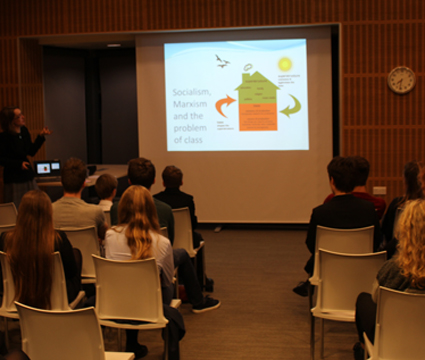Last week, Bloxham’s Eunoia Society welcomed Catherine Charlwood to speak on the subject of “Reading the Titanic: How we know what we know about an event”
Thank you to Bloxham School Sixth Former Emma Brodey for her report:
Every student in Bloxham School, or indeed, in education, is presented with knowledge. Catherine Charlwood, from the University of Warwick, however, came to deliver a lecture to our Eunoia Society explaining why we ought to be dissatisfied with a concept of knowledge as a system of undeniable fact, using the Titanic disaster as a case study.
Charlwood presented us with antithetic readings of the Titanic. We had all heard the phrase ‘women and children first’, but could hardly believe the conflicting interpretations that can result. Suffragettes and feminists used this display of chivalry to argue that the value of women and men in society should be equal. Conversely, Clark McAdams used the same phrase in his poem against women’s suffrage. Ms Charlwood then proceeded to present us with the socialist attitude that those who died on the Titanic were only significant due to their class. She presented us with examples from The Miners Magazine, which wanted equal commemoration of the countless miners whose lives are lost, and she introduced us to the Triangle Shirtwaist crisis and raised the question of why we had never heard of it.
Ms Charlwood demonstrated to the Eunoia Society that the knowledge we receive is altered by its presentation and our own perception. It encouraged us to consider the commemoration of events ‘ will the refugee crisis still be remembered in a century’s time? Will we still be remembering the death of Princess Diana? It also prompted us to reflect on what biases and perspectives influence the knowledge we possess. Is, due to the interpretation of any event by the human brain, bias unavoidable? Is taking a particular perspective necessarily negative, or could viewing the Titanic from a feminist, socialist or any other viewpoint help us to understand better society’s treatment of ‘marginalised individuals? Catherine Charlwood presented us with an interesting and thought-provoking talk.


